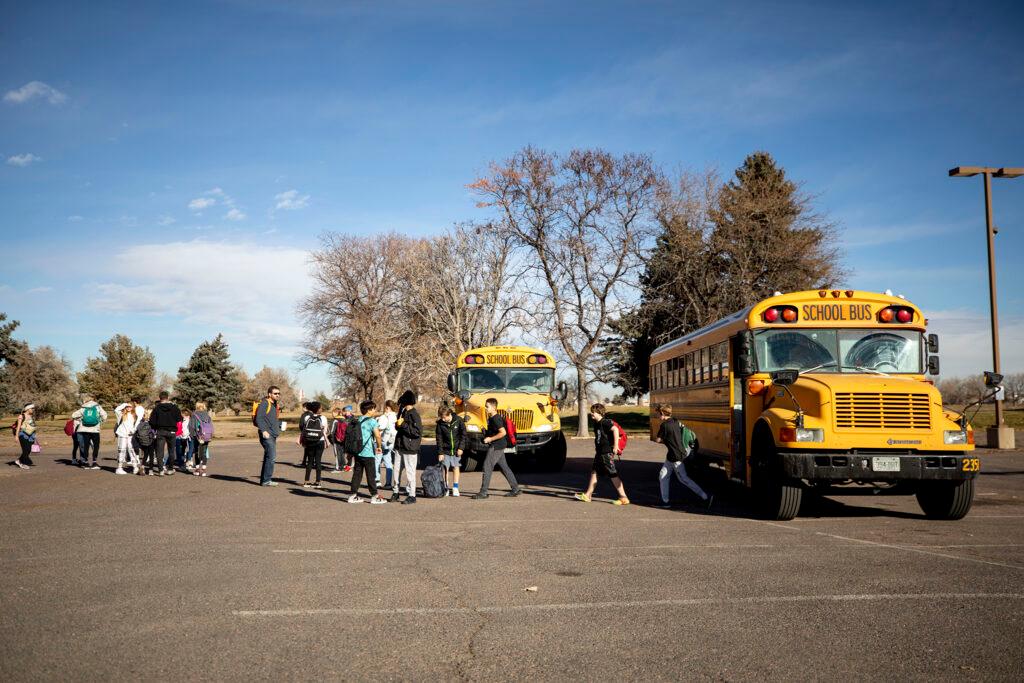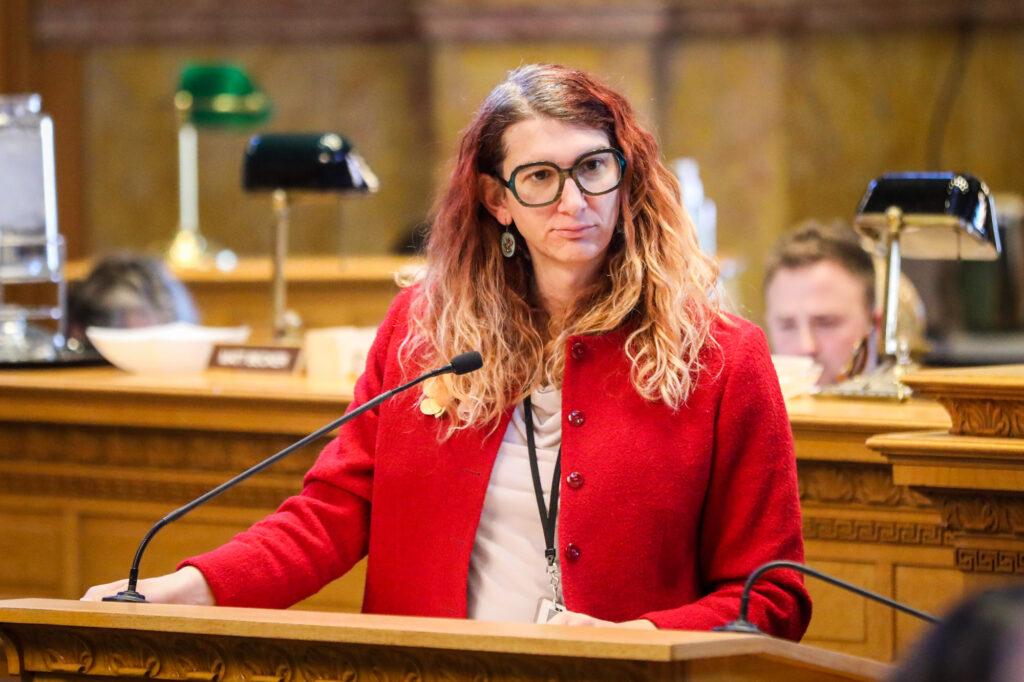
Should K-12 schools in Colorado be required to use students’ chosen names on unofficial documents such as rosters and student IDs, without a legal name change or parental notification?
That question was the subject of a three-and-a-half-hour hearing at the statehouse on Thursday. The rights of parents, and whether schools should have to inform them about a student’s name change, came up repeatedly in the at times contentious debate.
Supporters said the measure would save lives by affirming the identity of trans youth in schools, while opponents worried it would infringe on parental rights and allow young people to make important choices without guidance.
House Bill 1039 began as a recommendation from the Colorado Youth Advisory Council – a group of students representing every senate district in the state, who develop legislative proposals each year.
“Many school administrative systems cause humiliation for transgender Colorado youth when schools use the students’ deadnames (birth names that do not align with their gender identities),” wrote the advisory council in its proposal to lawmakers. “When schools keep a student’s former name and gender marker on school transcripts and records, it outs transgender students to their peers, thereby violating their privacy.”
El Paso County high school student Meghan Taylor has been working on the effort for more than a year. In her testimony Thursday, she said the bill was inspired by the experience of a friend and comes from a place of love, care, and respect for trans youth.
“When I was 12, I had a friend who wanted to kill themself. They didn't feel they had support or love for their identity from anyone in their lives. They didn't feel like they were a person or an individual or a child with a real life ahead of them and they felt like that was their only option to make it better,” said Taylor.
Scientific studies have found that trans and nonbinary youth whose gender identity is accepted by the adults and peers around them have a lower risk of attempting suicide.
If you need help, dial 988 to reach the Suicide and Crisis Lifeline. You can also reach the Colorado Crisis Services hotline at 1-844-493-8255 or text “TALK” to 38255 to speak with a trained counselor or professional. Counselors are also available at walk-in locations or online to chat.
At Thursday’s hearing, other trans students and family members told stories of being bullied and taunted. Z Williams said they have been out as a trans person for 20 years, and now work as a successful attorney, but remembers a harrowing childhood.
“I was outed coercively by lynched Barbie dolls being hung from my locker,” Williams testified.
They said they dropped out of high school after being beaten up by the football team because that was the safest option.
“I turned 38 years old yesterday. That makes me a trans elder in my community because trans kids don't get to grow up to be adults. This is your chance to change that,” said Williams.
Democratic state Rep. Stephanie Vigil from Colorado Springs, the main sponsor of HB-1039, said the measure isn’t breaking new ground, but instead essentially clarifies existing state law to help teachers and administrators who are unsure how to navigate situations in which students ask to be called by a name that differs from their legal name.
“The Colorado Civil Rights Commission has already identified that it would be discriminatory to persistently refuse to address (a student) the way they want to be addressed,” Vigil said. But she added school officials sometimes don’t understand that they “do not need a court order with a legal name change just to address a student the way they want to be addressed.”
The bill would mandate schools have a written policy for how they will comply with non-discrimination laws as they relate to the use of chosen names and pronouns. Vigil noted her bill would not prescribe school policies about “what sort of communications they need to make to parents in a variety of situations.” That would be left up to each institution.
Vigil also reiterated, “There is currently no state law that would compel a teacher to pick up the phone and call home to a parent and tell them that their kid is using a different name at school. It's not a current precedent that we are overturning.”
The bill cleared the House Education Committee on a 7-4 party-line vote, with Republicans in opposition. It was also significantly amended. Lawmakers removed a provision that would have created a task force in the Department of Education to study and recommend policy changes on issues such as parental notification.
Opponents said they are concerned about the bill’s ramifications and what the potential lack of involvement by parents in their children’s decisions could mean for families.
“Parents are always involved in major decisions regarding their children. That is their right as parents, and this bill completely decimates that relationship between schools and parents,” Jarvis Caldwell told the committee. He’s a parent, Republican statehouse candidate, and charter school board member in Colorado Springs.
On the other side of the parental rights debate, Lara Matisek of Colorado Springs argued that “For some children that do have affirming and loving homes, their parental rights and wishes are not being respected if their child is not being recognized by their chosen name” at school.
Dr. Rich Guggenheim testified on behalf of the Colorado chapter of Gays Against Groomers, a far-right anti-trans group. He said the bill would normalize the social transitioning of children.
“Social transition reinforces a child's gender confusion and, worse, it creates a social environment that pressures and encourages a child to continue down the path to medically transition. It is not neutral or harmless,” said Guggenheim.
A study published in the Journal of Adolescent Health counters this, finding that social transition does not harm trans and non-binary youth. However, the study did find that gender identity-based harassment and discrimination in K-12 environments was harmful.

Republican state Rep. Brandi Bradley of Douglas County said the more secrets children have from their parents, the more chances there are for mental health problems in the home.
“I certainly would not agree with a school covering up something as big as this,” said Bradley before the hearing.
“I'm not here to argue about what you can do when you're 18 or older,” she said. “I'm here to argue about my 12-year-old going to school, saying that he can have a different name and then he has to come home and hide that. I can't imagine mentally what that puts on a child.”
Some parents and guardians worry the policy could encourage students to keep secrets and hide parts of their identity, even from families who are caring and supportive.
But Democratic state Rep. Brianna Titone, Colorado’s only transgender state lawmaker, said that while parents have a critical role, in some cases school is the place of support and refuge when children aren’t ready to come out at home.
“Parents need to shepherd their kids to good decisions to do things for them, but they are individuals and there's a lot of situations where parents can be the problem,” Titone said.
She said when she was growing up she felt different and didn't know how to talk to her parents about that. She said she came out to them when she was 37 years old, and they ended up being fine with it.
“It took me that long because I was afraid of losing them. These youth are afraid of disappointing their parents. It's like they don't want to upset their parents, they want to be good. They want to be everything that their parents want them to be,” Titone said.
Sarah Hunt, president of Colorado’s Charter Advocacy Coalition, warned the panel the bill isn’t fair to educators.
“How will teachers be afforded due process in instances of using a name inconsistent with the student's choice?” she wondered. “This bill places no limits on how often a name can be changed, nor does this bill contemplate how many gender identities exist.”
The measure next heads to the full House floor for further debate.








